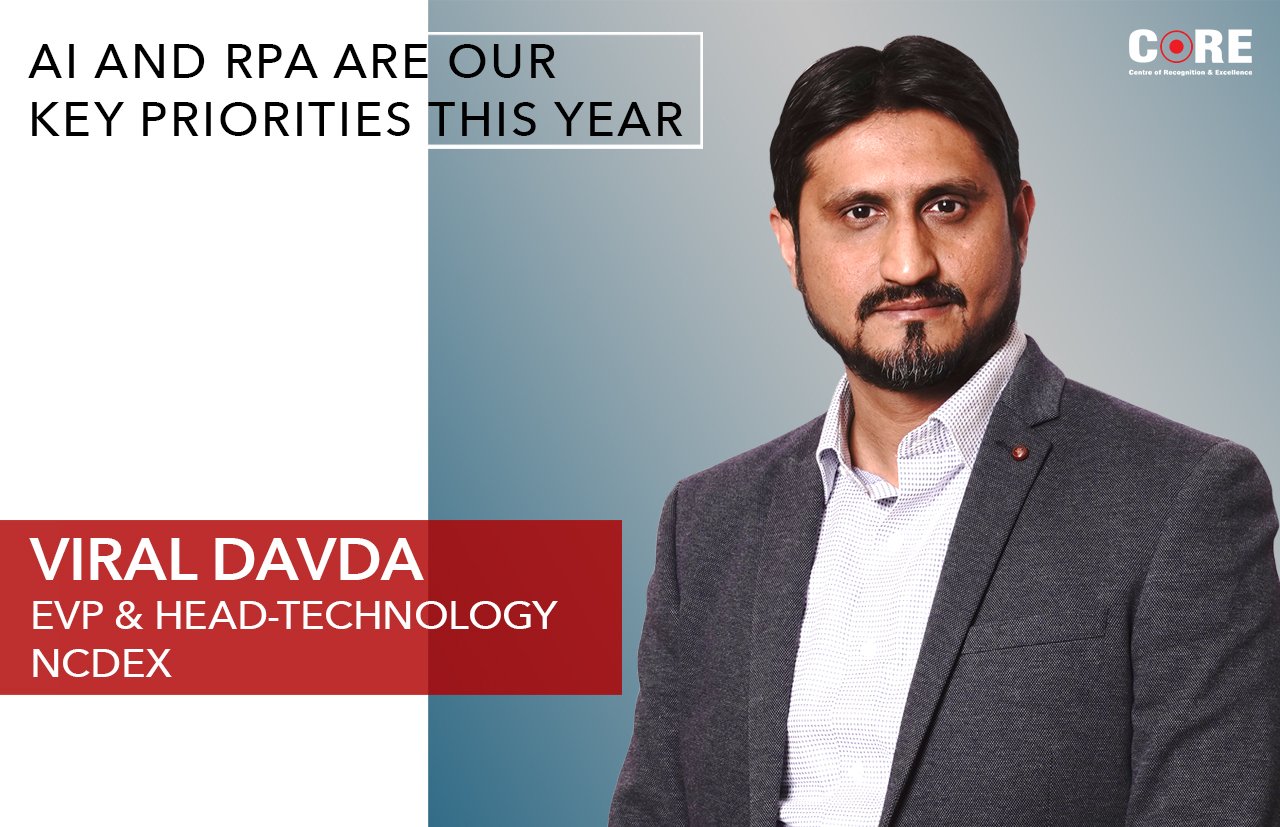Viral Davda, EVP & Head –IT of NCDEX shares the technology roadmap of his organization in an exclusive interview with CIO Dialogues and reveals how NCDEX plans to serve its stakeholders better.
National Commodities and Derivatives Exchange limited (NCDEX) has played a pioneering role in the agricultural market since its inception in 2003. Over the years this entity has embraced technology to deliver better serivices to the farmers and the traders.
Over the last few years the company has transitioned to the cloud. Viral Davda, EVP & Head –IT of NCDEX shares the technology roadmap of his organization in an exclusive interview with CIO Dialogues and reveals how NCDEX plans to serve its stakeholders better. Here are some excerpts from the interaction.
NCDEX is an online multi commodity exchange. What are the typical business challenges you face on a day-to-day basis from a functional and operational standpoint?
NCDEX is the largest agricultural commodity exchange in India, based on both average daily traded value (“ADTV”) and open interest (“OI”) with over 80 % of market share in the agricultural commodity segment. Being a Market Infrastructure Institution and a regulated entity, we need to have a laser sharp focus on availability, reliability and performance. Business scenario is changing faster than ever and that demands technology to partner with business and drive the changes ahead of time. With technology space itself changing at a very rapid pace, there is always a challenge to do things cheaper, faster and better.
You have begun your cloud journey recently. What were your apprehensions about the cloud model before you adopted it? How were your cloud service providers able to resolve them?
Not really. We began our cloud journey in early 2017 when we migrated our email to Google Cloud. This was followed by HRIS. However, we were still apprehensive about our core systems. Concerns were specifically related to data security and viability of implementing a few technologies over public cloud – specifically multicast support over the Internet. Our team extensively engaged with cloud service providers, particularly AWS and Azure, over a series of architecture and design discussions and executed a few PoC which helped us gain confidence and brought a lot of clarity in terms of use cases. This helped us take the next steps.
Can you describe the cloud model you have deployed? What workloads have you moved to the cloud so far and what workloads have you kept on premise?
Apart from emails and HRIS, we have moved our entire dev and UAT set up to the cloud. We have also set up our member mock environment on hybrid cloud which provides a test environment to the brokers with fully functional but scaled down end-to-end trading and clearing set up. This was an important step towards establishing feasibility of moving our core production systems on the cloud which today is entirely on-premise.
Do you see your company moving more workloads to the cloud or are you looking at a hybrid strategy where the mission critical apps stay on premise and the peripherals move to the cloud?
It’s is clearly going to be a hybrid strategy, at least for some time. There are issues to solved and capabilities which needs to be built around the multicast support, across seismic zones and support for disaster recovery among other things. Then there are other issues related to shared infrastructure, equitable access, latency and connectivity which are very unique to our industry. Until then, we are planning to move our other auxiliary production systems on the cloud. Mission critical production systems like trading, surveillance and risk management will remain on premise.
What new technologies are you planning to deploy? Automation seems to be the trend today. How do technologies like AI, machine learning and Natural Language Processing figure on your roadmap?
Automation trend has been there for decades now. Only the application or the commercial usage of these technologies are getting broadened over the years. If we talk about AI or machine learning themselves, these were first introduced way back in 1956. However the usage of these technologies were very limited. RPA is another such example. I personally believe these technologies have immense potential to transform the way we do business or operate today. AI and RPA are particularly in our roadmap for the coming financial year.
What will be the primary growth drivers of NCDEX in the years to come? And how do you see technology catalyzing growth?
Over the years since its inception in 2003, NCDEX has played a pioneering role in agriculture commodities space and has created a robust ecosystem in this area across the entire agri value chain. We have made innovative interventions to modernize the Indian agricultural commodities space through our proprietary systems including electronic record keeping and transfers of agricultural commodities through Comtrack, enabling an electronic pledging mechanism, mandi modernisation, standardisation of commodity specifications across India for derivatives trading, development of modern warehousing practices, and connecting Farmer Producer Organisations (“FPOs”) to futures markets.
We at NCDEX, firmly believe that future businesses will be tech driven and therefore technology is going to be a key catalyst for future growth. We see a huge traction and potential in the FinTech and Argitech areas. With our background and domain expertise in agri commodity business bundled with strong technical capabilities, we see ourselves uniquely positioned to capitalize in these areas and make a positive difference in the Indian agricultural economy and put technology in the hands of the farmers.


